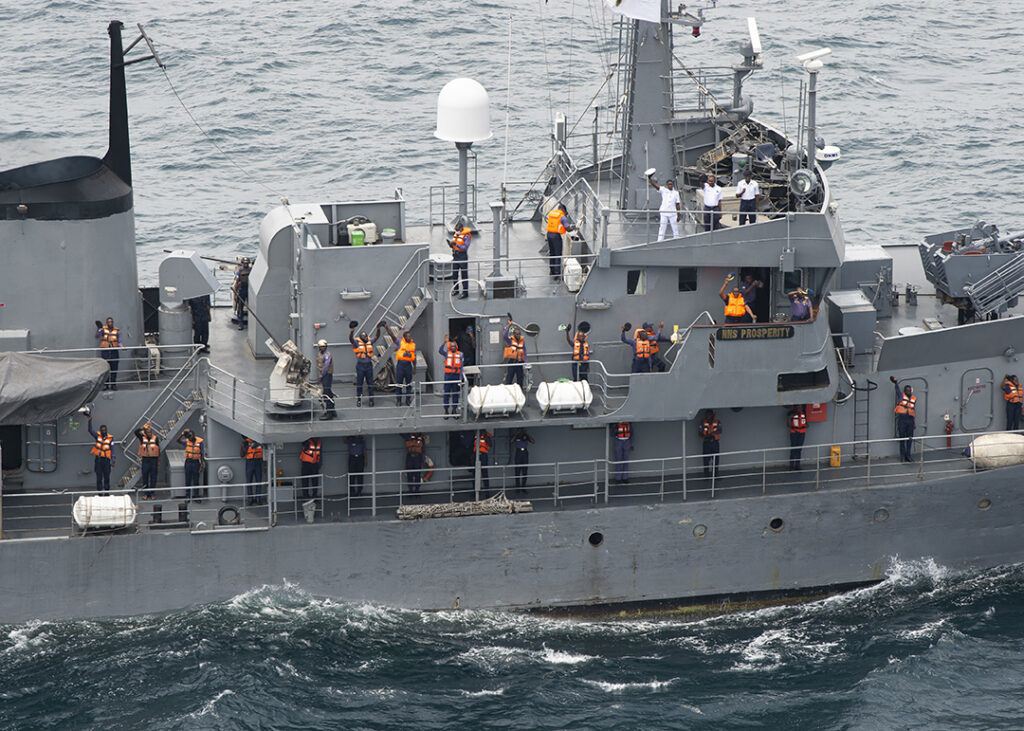ADF STAFF
The Nigerian Navy aims to use Artificial Intelligence (AI) to strengthen its operational capacity and keep pace with evolving technological advancements in the maritime industry.
Chief of the Naval Staff Vice Adm. Emmanuel Ogalla revealed this in August during the presentation of a paper by Navy participants at the National Defence College, titled “Artificial Intelligence and Ship Maintenance: Strategic Options for the Nigerian Navy by 2035.”
Ogalla said the Nigerian Navy is embracing AI since it and other emerging technologies increasingly are used in ship construction.
“The Nigerian Navy must continue to adopt and integrate these technologies in order to maintain a competitive edge during operations,” Ogalla said in a report by Nigerian newspaper Leadership.
AI can inform a Navy’s decision-making processes, such as predicting the most fuel-efficient way to operate a vessel. It can be included in a ship’s navigation system, radar operations or threat-detection systems to allow operators to process information faster.
The technology has grown in popularity as maritime battlefields become increasingly complex.
“Navies and warships in general have had a high degree of automation for a long time, with the most commonplace use of AI being in the Combat Management System (CMS),” Matthew Caris, senior director at Avascent, a global strategy consulting firm, told Armada International.
In automatic mode, CMS can detect a target and identify, classify, and prioritize targets before deploying weapons, although people are involved in decisions about when and how to use weapons.
Harnessing AI and other technologies will help the Nigerian Navy more effectively respond to a range of maritime threats such as illegal, unreported and unregulated (IUU) fishing; drug smuggling; and piracy.
Nigeria now loses about $70 million annually to illegal fishing perpetrated by a host of foreign fleets, mostly Chinese.
It is a scourge that plagues West Africa, the world’s epicenter for IUU fishing. It costs the region an estimated $10 billion a year, according to a September report by the Stimson Center, a think tank.
Since the early 2000s, the region also has emerged as a major transit point for cocaine and other drugs from South America en route to Europe. Drugs commonly are trafficked into Nigeria through Lagos and other port cities. In July, the Nigerian Navy helped uncover 24 kilograms of cocaine on a bulk carrier in Lagos. The drugs were hidden in a sugar shipment from Brazil.
After years of declining pirate attacks — there were 81 in 2020, 34 in 2021 and just three last year — the threat is resurging in West Africa, where five incidents were reported in the first quarter of this year and nine in the second quarter, according to the International Maritime Bureau (IMB).
The IMB says the number of actual and attempted piracy attacks on ships in Nigeria fell from 48 in 2018 to six in 2021. However, Nigeria’s maritime efforts to combat piracy have led to increasing pirate attacks on artisanal fishing villages.
In November 2022, Etim Asuquo and his family were outside their home in Issiet Ekim, southern Nigeria, when gunshots rang out. Asuquo escaped in the bush, but his brother, Okon, was one of two men killed in the assault.
“I still cannot believe how it happened. It was like a dream,” Asuquo told The Guardian. “I did not take anything. All my property, including my fishing equipment, was destroyed.”

